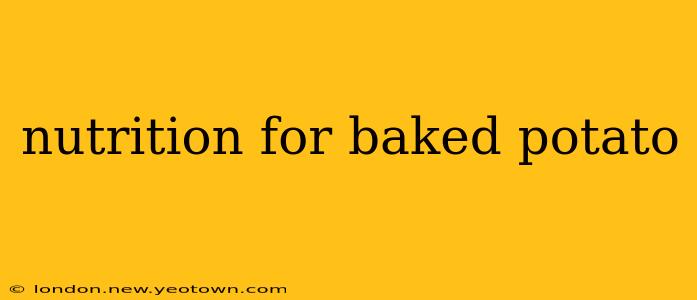The humble baked potato. Often overlooked as a side dish, it's actually a nutritional powerhouse packed with vitamins, minerals, and fiber. Forget the loaded baked potato stereotype – we're diving deep into the nutritional benefits of this versatile spud and exploring how to maximize its goodness. Let's peel back the layers (pun intended!) and uncover the surprising health advantages of this simple, delicious food.
What are the nutritional benefits of baked potatoes?
A medium-sized baked potato (about 5.3 ounces or 150 grams) provides a surprisingly impressive nutritional profile. We’re talking significant amounts of potassium, vitamin C, and vitamin B6. It’s also a good source of dietary fiber, crucial for healthy digestion and keeping you feeling full and satisfied. This fiber contributes to its low glycemic index (GI), meaning it doesn't cause a rapid spike in blood sugar levels, making it a suitable choice for people managing diabetes.
Think of it as a blank canvas for healthy eating—easily customizable to your dietary needs and preferences.
Are baked potatoes good for weight loss?
This is a question often asked, and the answer is nuanced. Baked potatoes themselves aren’t inherently fattening. Their high fiber content contributes to satiety, helping you feel fuller for longer and potentially reducing overall calorie intake. However, the way you prepare your baked potato significantly impacts its caloric value. Loading it with butter, sour cream, cheese, and bacon will quickly transform it from a healthy choice to a calorie bomb. Opt for healthier toppings like salsa, low-fat Greek yogurt, or a sprinkle of chives to keep the calories in check.
How many calories are in a baked potato?
The calorie count in a baked potato varies based on size and preparation. A medium-sized baked potato (around 150 grams) typically contains around 161 calories. However, adding toppings will increase this number considerably. This makes careful selection of toppings crucial for maintaining a healthy calorie intake.
What are the best toppings for a healthy baked potato?
The beauty of the baked potato is its adaptability! Forget the creamy, cheesy overload. Here are some healthy topping ideas to enhance the nutritional value:
- Salsa: Adds flavor, vitamins, and antioxidants.
- Low-fat Greek Yogurt: Provides protein and calcium.
- Black beans: A great source of fiber and protein.
- Steamed broccoli or spinach: Boosts vitamin and mineral content.
- Chopped chives or green onions: Adds flavor and vitamins.
- A sprinkle of nutritional yeast: Adds a cheesy flavor without the dairy.
Are baked potatoes healthier than mashed potatoes?
Generally, baked potatoes are considered slightly healthier than mashed potatoes. The baking method preserves more nutrients compared to boiling and mashing, which can leach out some vitamins and minerals. Additionally, mashed potatoes often incorporate added butter, milk, or cream, significantly increasing their calorie and fat content. However, both can be part of a healthy diet when prepared mindfully.
What are the potential downsides of eating baked potatoes?
While generally healthy, excessive consumption of potatoes can contribute to weight gain if portion sizes aren't controlled. Some individuals may also experience digestive discomfort due to the potato’s starch content, although this is usually manageable with proper preparation and portion control.
Conclusion: Embrace the Potato Power!
The humble baked potato, when prepared and topped thoughtfully, is a truly nutritional champion. It's a versatile and satisfying food that can easily be incorporated into a healthy diet. Remember to choose smart toppings and pay attention to portion sizes to reap the full nutritional benefits of this often-underestimated culinary treasure.

